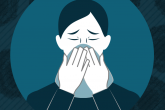
It would be a terrible shame to waste the lessons learned over the nearly three months of this great global timeout – a universal pause never seen before. The world it seems has stood still.
Crucial life lessons such as gratitude for simple things like family and relationships. We have a new awareness of essential workers and the debt we owe them. They are the men and women most of us take for granted or even worse ignore but, who we now profoundly appreciate for their integrity and courage. By showing up every day to do jobs that placed them in harm’s way, their bravery allowed us to shelter safely in our homes protected from the Coronavirus.
Five valuable lessons from this pandemic can enhance your wellbeing now and in the future.

- Underlying good health is the best condition
There’s a lot we don’t know yet about COVID-19, questions about the disease that only time and science can answer. The big takeaway, however, is that most of the people who had the most severe illness had underlying health conditions.
A new study for the CDC looking at data across the U.S showed that about 90% of those hospitalised due to COVID-19 have one or more underlying conditions. A paper published in the Journal of the American Medical Association found that out of about 5,700 COVID-19 patients hospitalised in the New York area, only 6% had no preexisting health conditions.
Nearly 60% of those hospitalised had high blood pressure, 40% were obese, and about one-third of patients had diabetes. A smaller percentage of patients had other chronic illnesses, such as kidney disease, heart disease, and chronic lung disease. Obesity is linked to the highest risk of becoming severely ill from COVID-19. China, Germany, and the U.K. have similar data.
Here’s the bottom line. You already know that unhealthy lifestyle habits put you at risk for obesity, heart disease, diabetes, hypertension, and even cancer. Poor health habits cause chronic health conditions, which can lead to severe illness if you get COVID-19.
Adopting a healthy lifestyle by exercising regularly and eating heart-healthy foods is one of the best possible changes you can make right now. It sounds straightforward and is harder to put into practice, but you’ll find that it works to improve your overall quality of life. Many people can control existing high blood pressure and diabetes with exercise and healthy eating only.
Eat less fatty foods, more fresh fruits, and vegetables, whole-grain foods, and fish. Reduce the amount of red meat, sugar, and salt in your diet and drink plenty of water. Get 7 to 8 hours of rest every night. Sleep is the most underestimated function of your body. It is amazingly restorative for your brain, body, and immune system and balances your stress hormones.
Everyone is looking for a way to “boost the immune system” to avoid getting COVID-19. Yet, everything you need to strengthen your immunity without resorting to dubious or harmful means is already available. You simply have to decide and commit to a healthy lifestyle.

- You don’t need a gym or a lot of expensive equipment to stay fit
With stay-at-home orders just about everywhere except Sweden, every imaginable form of exercise from high-intensity workouts to yoga is now available live-streamed via the internet. Instructors Zoom their classes into our homes and make a point to let us know that we need very little by way of exercise equipment.
With your own body weight, two full water bottles (600 ml or 750 ml size) as added hand-held weights, a resistance band, and a yoga mat, you have all the stuff you need. Add to that the great outdoors, and you’re set for fitness.
Everyone is experiencing a loss of normalcy due to COVID-19, anxiety, fear, uncertainty, and for many, the loss of loved ones or livelihoods. Exercise can be very therapeutic right now because of the natural mood-lifting endorphins, even moderate activity produces. It also has the added benefit of boosting your energy and attention.
Moderate exercise – at least 30 minutes a day for five days or more per week – keeps you fit. When combined with a healthy diet, it provides stamina, lowers blood sugar and cholesterol, improves mood, and helps you maintain a healthy weight. A brisk daily walk or jogging has enormous benefits. Regular exercise can prevent obesity, hypertension, heart attack, stroke, and diabetes. It even improves existing diabetes or high blood pressure and reduces obesity.
- The environment is cleaner because we stayed home
Carbon emissions have fallen sharply globally since lockdowns began due to the COVID-19 pandemic. As humans have stayed indoors, air pollution has dropped to a level not seen in decades. It’s a pity we have to wear masks, the air quality hasn’t been this good in years!
Rush hour traffic no longer exists. Punjabis in India can now see the Himalayas Mountain peaks, a sight usually blocked by pollution. Lagoons, lakes, and rivers are cleaner, reflecting clearer blue skies above.
This can be the future if we all do our part – governments, industries, and individuals. Drive only if necessary, manage your waste better, use less plastic, and recycle. As custodians, let’s treat the earth that sustains us with the care that we should.

- There are beauty and sanity in simplicity
The COVID-19 lockdown got rid of clothing categories. Activewear, sleepwear, work clothes,
and Casual Friday all meant the same things – a T-shirt, sweatpants, or shorts. Men stopped shaving – women did too and gave up makeup as well. Being able to give a home haircut is now a desirable skill set.
We’ve learned that slowing down, doing less, and making do with less can lower our stress levels. Stress causes a rise in the stress hormone cortisol. Cortisol is bad news. It increases blood sugar, stiffens arteries, and increases your blood pressure and abdominal fat. Let’s re-prioritize, be mindfully present for our lives, and be deliberate in making time to truly relax.
- Relationships are the most valuable things we have
Nothing has been more missed during this COVID-19 lockdown than physical connection with family and friends. Those who lost loved ones to the disease are grieving doubly. Firstly from not being allowed to physically offer comfort as they suffered in the hospital and then not being able to hold them and say goodbye.
It is clear that other than life itself, relationships are the most valuable things we have. Let’s nurture our relationships – all of them – and connect in a meaningful way with everyone we are fortunate to have in our lives. Meaningful connection with others is vital for good mental and physical health.
As your city re-opens and you begin the new normal, re-engaging in activities outside your home, hang on to your lockdown lessons. Remember, please wear a mask when you’re around others, maintain social distancing, and wash your hands frequently throughout the day. It’s your social responsibility.
Toju Chike-Obi, MD

